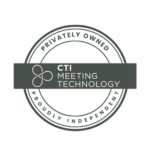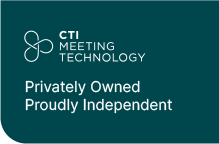In recent years, the debut of Artificial Intelligence (AI) has disrupted every business, and the event industry is no exception. In fact, a recent study by PwC predicts that AI will contribute $15.7tr to the economy by 2030. Scientific conferences, which serve as platforms for knowledge exchange, collaboration, and innovation, can benefit from leveraging AI features to enhance conference management and the attendee experience. In this blog post, we will explore 5 useful tips to maximize the use of AI for scientific conferences in 2023. By taking these tips into account, organizers can improve efficiency, gain valuable insights and data, and create an engaging environment for attendees.
What is AI?
You may have heard and read about AI since the beginning of the year, but what exactly is Artificial Intelligence? Let’s explore:
Artificial intelligence, most commonly known as AI, refers to the development of machines and computer systems capable of performing tasks that typically require human intelligence. AI technology has made significant advances in recent years and is now being integrated into various sectors, including event planning and management.
While AI has made significant advancements in recent years, it remains an evolving field with ongoing research and development, and it has the potential to disrupt the event planning industry in the future. As a meeting planner, it is crucial to be aware of current trends and adapt to the circumstances. Keep reading to explore the benefits of incorporating AI into your events.
Overview of the benefits of AI for scientific conferences.
Incorporating AI into scientific conferences offers several benefits that contribute to the overall success of your meeting:
- Improved Efficiency: One of the main benefits of using AI tools is the automation of manual tasks. Organizing a conference involves numerous administrative and manual processes that consume valuable time for organizers. AI can assist in completing these tasks quickly and accurately, saving significant time and effort.
- Enhanced Decision-Making: AI analytics tools provide valuable data-driven insights, allowing event planners to make better decisions. By analyzing attendee preferences, session feedback, and engagement metrics, organizers can optimize conference content, identify meeting trends, and tailor future conferences to better meet attendees’ needs.
- Enhanced Attendee Experience: AI tools can offer recommendations and suggested schedules to enhance the attendee experience. Attendees can discover sessions aligned with their interests, find potential collaborators, and optimize their conference schedules, which will maximize the value they get from the meeting.
Overall, the applications of AI in scientific conferences present great potential for both organizers and attendees. By transforming traditional processes, AI can lead to more successful and impactful events.
Trends in AI Integration within Scientific Conferences.
AI tools will continuously shape the way scientific conferences are planned and experienced. It is crucial to keep an eye on the latest trends reflecting the advancements in AI and their applications in the meeting planning sector. Here are some current and future trends to consider for the events industry:
- Generative Tools: Event organizers can utilize generative AI algorithms to create meeting content, from session prompts to stock photos or videos. These tools transform existing digital data into new and unique content, saving organizers time and effort in content creation and research.
- Personalized Attendee Experience: AI enhances attendee experience by providing personalized recommendations and tailored schedules. These algorithms can analyze attendee preferences and interactions to suggest relevant sessions, presentations, and networking opportunities, crafting a personalized experience for each attendee.
- Real-time Feedback and Engagement: AI tools can also enable real-time feedback and engagement mechanisms during conference sessions. Attendees can provide instant feedback through AI-powered survey tools, or interactive voting systems. This feedback can help presenters gather audience reactions to identify trends and adjust the sessions for a more interactive and engaging conference.
- AI-Driven Networking Platforms: Networking platforms can leverage AI algorithms to match attendees based on their research interests and expertise. By facilitating connections between like-minded individuals, AI-driven networking platforms foster impactful collaborations and knowledge exchange, which is crucial for scientific conferences.
- AI Analytics for Data-Driven Insights: AI algorithms can process vast amounts of data generated during conferences, such as attendee behavior, session attendance, and social media interactions. By analyzing this data, organizers can gain valuable insights into attendee preferences, identify meeting trends, and use this information to improve future events.
- Natural Language Processing (NLP) and Machine Learning (ML): NLP and ML techniques can be integrated into conference management systems to automate tasks such as abstract review, recommendations, and session scheduling. NLP enables advanced text analysis and understanding, while ML algorithms can analyze historical data to make accurate predictions and recommendations.
These trends show the growing integration of AI in scientific conferences, enabling organizers to streamline processes, enhance the attendee experience, and make data-driven decisions. By keeping up to date with these trends, conference organizers can leverage AI effectively to create more engaging, efficient, and impactful scientific conferences.
Tip 1: Embrace AI-Powered Software Management Systems.
There are many, many steps to organizing a scientific conference. AI technology can streamline many of these processes and help save time for you and your team! Here are some ways in which organizers can utilize AI tools to manage their events in an easier way:
- Automated Tasks: Take advantage of AI-powered software management systems to automate many of the time-consuming tasks involved in conference organization. This includes abstract submission and review processes, scheduling sessions, coordinating with speakers, and managing logistics. By automating these tasks, meeting organizers can save significant time and effort, allowing them to focus on more strategic aspects of event planning.
- Improved Efficiency: Linking to the previous point, AI algorithms can optimize processes within the software management system, improving efficiency. For instance, AI can be used to organize session schedules to avoid conflicts and maximize attendee engagement. AI can also help with resource allocation, such as assigning appropriate rooms based on session requirements and expected attendance.
- Brainstorming: Coming up with session names or promotional content for the meeting can be exhausting. Organizers can utilize AI tools to suggest ideas, content, or even images and video, and save time researching.
- Personalization and Customization: As mentioned before, AI can enable personalized experiences for conference attendees. The software can gather information about attendees and their preferences to suggest relevant sessions, speakers, and networking opportunities. It can also provide personalized recommendations for exhibitors or sponsors based on attendees’ interests.
- Real-time Communication and Support: AI-powered software management systems can offer real-time communication and support features, such as chatbots, that can handle attendee questions, provide useful information, and assist with tasks. Attendees can get immediate responses to their queries, reducing the need for manual intervention, which saves organizers time and money.
As an alternative, – or in addition to a chatbot – look for a software provider that can provide reliable technical support to your users.
Tip 2: Utilize AI Analytics for Data-Driven Insights
Organizers can leverage AI analytics tools to obtain valuable data-driven insights from conference data, saving time and enabling informed decision-making to enhance the overall conference experience. AI-powered tools can analyze vast amounts of data generated during the conference, including session attendance and social media interactions, among others.
However, AI goes beyond data collection; it can discover patterns in attendee behavior, trends, and preferences, allowing organizers to tailor future conferences to meet attendee expectations. Moreover, personalization can be achieved by recommending sessions based on preferences and past interactions, ensuring participants find relevant and valuable content.
AI analytics also provide useful information about audience engagement during sessions, enabling organizers to identify speakers that resonate with the audience and consider them for future conferences. This information proves valuable for making data-driven decisions. By extracting insights from attendee behavior, session metrics, and feedback, organizers can make informed choices regarding program design, session formats, scheduling, and resource allocation. This approach ensures that decisions are based on objective data, leading to continuous improvement and the success of future conferences using historical data.
Organizers can quickly identify areas of strength and areas that require improvement, adapting the planning process to enhance future events. This data-driven approach drives the ongoing development and success of conferences.
Tip 3: Ensure Ethical AI Practices
AI is constantly evolving, and it is crucial for the world to adapt to these changes, especially in terms of security. Conference organizers must prioritize ethical considerations when implementing AI systems into their meetings. Ethical AI practices promote fairness, transparency, and accountability, ensuring that the use of AI technology aligns with ethical standards and respects the rights of everyone involved. Keep reading for some ways organizers can ensure ethical AI practices:
- Transparency: The first step – and perhaps the most important – is ensuring transparency in the use of AI tools or algorithms, and clearly communicating it to meeting participants. Additionally, efforts should be made to explain the functioning and decision-making processes of AI systems in a way that’s easy to understand. This helps build trust and allows attendees to understand how their data is being used.
- Human Intervention: AI algorithms are not perfect. While it can automate and optimize several processes of the conference, it is important to maintain human involvement to ensure that every process is running correctly and according to ethical practices. Furthermore, including human review of AI-generated outputs, such as abstract selection or session recommendations, helps prevent potential biases or errors.
- Continuous Monitoring and Improvement: Regular evaluation and improvements of AI algorithms, metrics, and outcomes is essential to identify and fix any ethical issues that may arise. Continuous improvement ensures that AI systems align with ethical standards and adapt to changing needs and concerns.
- Stay Up to Date with Industry Standards: Organizers should research and collaborate with experts in AI to ensure alignment with best practices and industry standards.
By ensuring ethical AI practices, conference organizers can guarantee fairness, transparency, and accountability in the use of AI technologies. This not only protects the rights and interests of conference participants but also establishes trust and credibility in the application of AI within scientific conferences. Ultimately, this contributes to the overall success and positive impact of the conference.
Read more about the ethics of AI and recommendations in the latest UNESCO guide.
Tip 4: Emphasize Data Security and Privacy
In the digital age, data security and privacy are of high importance, especially when managing attendee data for conferences. Conference organizers must prioritize data protection and ensure compliance with relevant data protection regulations and ethical practices. Here are a few tips on how to guarantee data security and privacy:
- Secure Data Collection and Storage: Implement robust and secure data collection and storage practices to protect attendee data. This involves using secure protocols for data transmission, encrypting sensitive information, and establishing secure storage systems with access controls. By closely monitoring this process, organizers can also reduce the risk of data breaches and ensure the safety of attendee data.
- Compliance with Data Protection Regulations: Meeting organizers must comply with applicable data protection regulations as well, such as the General Data Protection Regulation (GDPR) or other data privacy laws. This involves getting consent from attendees for data collection and processing, providing transparency about how their data will be used, and informing individuals about how to exercise their data rights, such as access or deletion.
- Data Sharing and Third-Party Providers: When collaborating with third-party service providers or sharing data with partners, organizers must ensure that appropriate data protection agreements are in place and effectively communicated to participants.
- Data Retention and Destruction: Conference organizers should establish clear policies regarding the retention and destruction of attendee data. Data should be retained only for as long as necessary and only with the individual’s approval. After that, data must be securely deleted from all relevant systems and storage.
- Regular Security Audits: Conduct periodic security audits and assessments to help identify vulnerabilities in data security measures. It is essential to conduct regular audits of networks and data storage infrastructure to ensure compliance with security standards. This will also help quickly identify any issues and reduce potential security risks.
Taking these tips into account, while also educating individuals about data management, will allow organizers to prioritize data security and privacy. This extra step ensures that attendees can engage in conference activities without concerns about the misuse or unauthorized access to their personal information.
Tip 5: Stay Updated with AI Trends and Innovations
The AI landscape and its capabilities are constantly evolving, making it essential for event organizers to stay updated with the latest trends and innovations. By staying informed about advancements in AI, organizers can make better decisions and adapt their conference strategies to maximize the benefits of these technologies.
There are several ways to stay up to date. The easiest is to follow AI thought leaders, publications, blogs, newsletters, and social media accounts. By reading articles, research papers, and blogs shared by experts in the AI field, organizers can stay informed about the latest AI trends. Additionally, joining online forums and discussion groups can provide more knowledge about AI while also offering networking opportunities with like-minded individuals.
Attending AI conferences and workshops is another excellent way to gain insights into the latest trends and innovations directly from experts. As an event organizer, the key is to ensure that the information comes from reliable sources and can be integrated into your own conference. This will help differentiate you from competitors and provide a more personalized experience for attendees.
—
In summary, embracing AI technologies in scientific conferences can bring numerous benefits to organizers and contribute to maximizing meeting success! Let’s recap the tips discussed above:
- Current Applications of AI: We have explored how AI can automate and simplify tasks and processes in scientific conferences. AI technologies streamline processes, enable data-driven decision-making, and enhance the attendee experience.
- Benefits of Leveraging AI: There are several benefits to incorporating AI in conferences, including improved efficiency, better decision-making, and insightful analytics. AI analytics enable organizers to personalize content and make informed decisions to ensure conference success.
- Trends in AI Integration: We discussed some of the latest trends in AI integration within scientific conferences, such as natural language processing, machine learning, and virtual assistants or chatbots. Staying updated with these trends allows organizers to stay ahead of competitors and adapt conference strategies accordingly.
As you can see, embracing AI in scientific conferences is crucial for organizers to stay competitive, deliver exceptional experiences, and stay up to date with the evolving landscape of technology. AI brings efficiency, personalization, and data-driven decision-making to conference management, enabling organizers to curate compelling programs, optimize resources, and create meaningful interactions for attendees.
As the scientific conference landscape continues to evolve, it is vital for organizers to accept AI as a strategic tool. So, take the first step in embracing AI for your scientific conference in 2023! By integrating AI technologies and practices, you can take your conference to the next level, deliver unforgettable experiences, and create a lasting impact in the scientific community.





